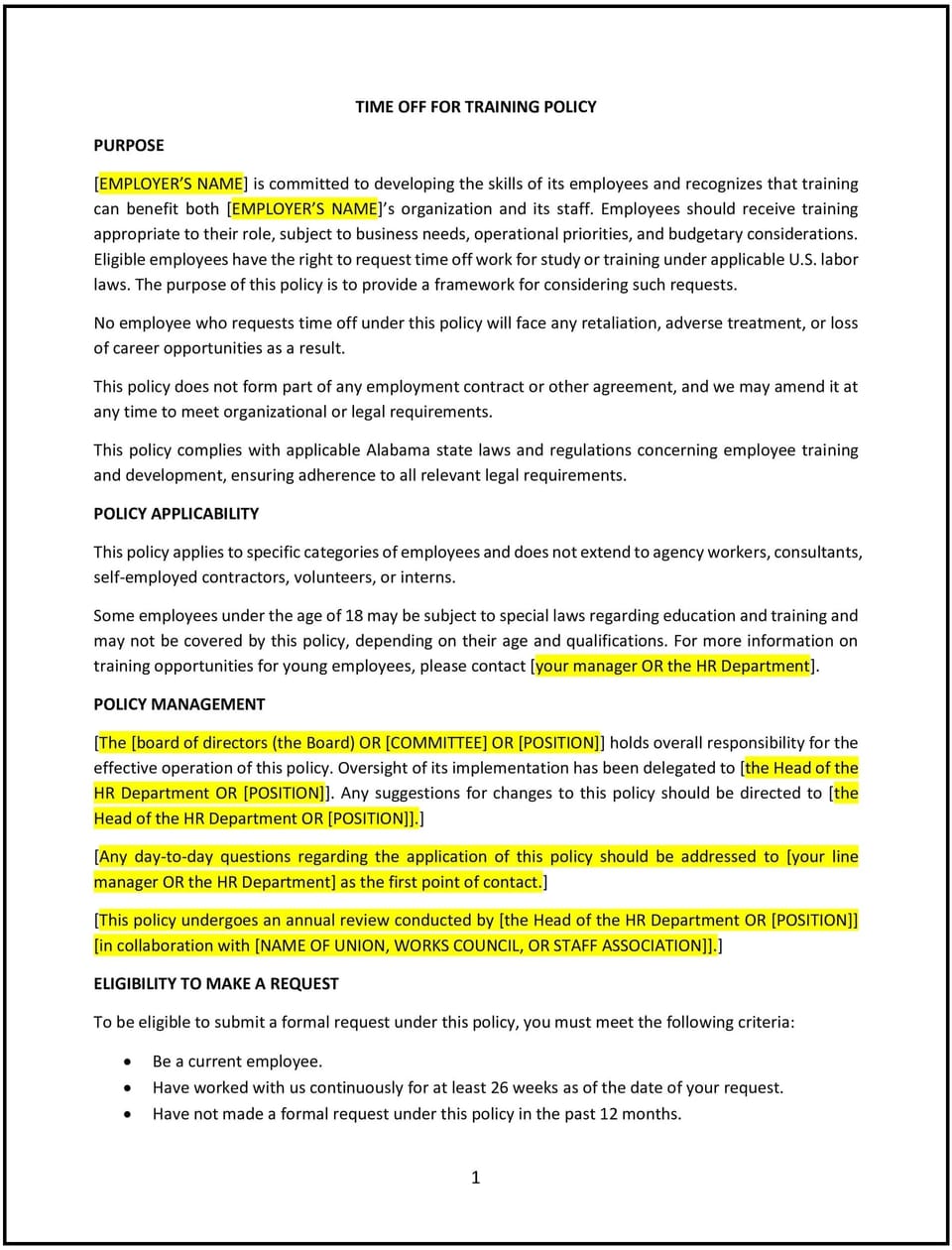Time off for training policy (Alabama): Free template

Time off for training policy (Alabama)
A time off for training policy provides employees with a clear framework for requesting and attending professional development opportunities during work hours. For SMBs in Alabama, this policy fosters skill-building, aligns with company goals, and ensures a structured approach to managing employee training schedules.
This policy outlines eligibility, the approval process, and expectations for employees participating in training programs, helping businesses invest in their workforce while maintaining operational efficiency.
How to use this time off for training policy (Alabama)
- Define training opportunities: Specify what types of training qualify for time off, such as workshops, certifications, seminars, or continuing education programs relevant to job roles.
- Set eligibility criteria: Clarify which employees or roles are eligible for training-related time off, considering tenure, performance, and alignment with company objectives.
- Outline the approval process: Provide steps for employees to formally request time off for training, including submitting program details and expected outcomes to their manager or HR.
- Address payment considerations: State whether training time is paid, unpaid, or partially reimbursed, depending on the company’s policy and the nature of the training.
- Establish expectations: Emphasize employees’ responsibility to apply learned skills on the job and share insights with their team where appropriate.
Benefits of using a time off for training policy (Alabama)
A time off for training policy benefits both employees and the business by supporting professional growth and improving workplace capabilities. Here’s how it helps:
- Encourages development: Promotes employee skill-building and career advancement, enhancing job satisfaction.
- Aligns with company goals: Ensures training opportunities directly contribute to the company’s operational and strategic objectives.
- Increases retention: Demonstrates investment in employees’ professional growth, fostering loyalty and reducing turnover.
- Maintains consistency: Establishes clear guidelines to manage training requests without disrupting business operations.
- Enhances productivity: Equips employees with new skills and knowledge that benefit their roles and the company as a whole.
Tips for implementing a time off for training policy (Alabama)
- Communicate opportunities: Share information about eligible training programs during team meetings, onboarding, or through internal communications.
- Monitor participation: Track employee attendance in training programs to measure engagement and effectiveness.
- Review alignment: Evaluate whether proposed training aligns with both the employee’s role and the company’s goals before granting approval.
- Offer flexibility: Where feasible, accommodate employees by adjusting schedules or workloads to facilitate their participation.
- Collect feedback: After training, gather input from employees about the program’s value and its impact on their performance.
Q: What types of training are covered under this policy?
A: Eligible training includes industry certifications, job-specific workshops, safety training, and continuing education programs that enhance job performance.
Q: Is time off for training paid or unpaid?
A: This depends on the nature of the training and company policy. Mandatory training is typically paid, while optional programs may be unpaid or reimbursed.
Q: How should employees request time off for training?
A: Employees must submit a formal request to their manager or HR, including details about the training program, its duration, and its relevance to their role.
Q: Are employees required to share what they’ve learned after training?
A: Yes, employees may be encouraged to share insights or conduct brief knowledge-sharing sessions with their team to maximize the training’s impact.
Q: Can employees be denied time off for training?
A: Time off may be denied if the training does not align with company objectives, conflicts with operational needs, or the employee does not meet eligibility criteria.
Q: Are there limits to how much time can be taken off for training?
A: The policy may set annual limits on training-related time off to ensure balance between professional development and operational demands.
This article contains general legal information and does not contain legal advice. Cobrief is not a law firm or a substitute for an attorney or law firm. The law is complex and changes often. For legal advice, please ask a lawyer.


